
NY Coastlines—New York Sea Grant (NYSG)'s flagship publication—and its news archive, Currents, highlight news, events and other activities from our coastal program's various research, extension and education endeavors throughout New York's marine and Great Lakes waters
Winter 2021
NY Coastlines / Currents; Vol. 49, No. 1 / Vol. 9, No. 1
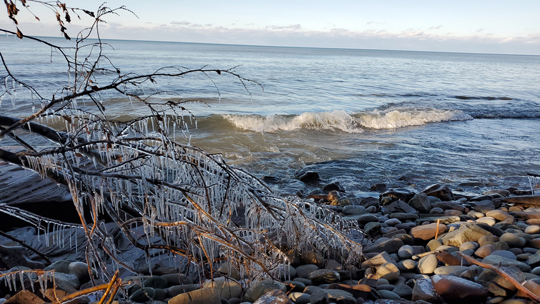
NYSG Director's Letter: Becky Shuford
Happy New Year!
The end of 2020 closed with some exciting news for the National Sea Grant College Program – of which New York Sea Grant (NYSG) and 33 sister programs are part of – Congressional passage of the "National Sea Grant College Program Amendments Act of 2020" – or Sea Grant's reauthorization. Please see the linked press releases below for more details! We are grateful to New York's House and Senate members for their critical support.
To kick off a great start of 2021 at NYSG, I would like to warmly welcome several new staff members to the NYSG family. In early fall of 2020 Emma Forbes joined the team as the program's first Aquaculture Specialist. Tanya Yanchuk also came on board in the fall as Administrative Assistant in our Ithaca office. Stacy Furgal rang in the New Year here at NYSG as our Great Lakes Fisheries and Ecosystem Specialist.
If you, or someone you know might be interested in becoming part of the NYSG team, we are advertising for a Great Lakes Outreach Coordinator – information on that position and how to apply is below!
Also in this issue you will find information about a number of other enticing opportunities:
• NYSG's Biennial Research Call has been announced – pre-proposals are due February 25th for the 2022-23 funding cycle.
• If you are a graduate student interested in coastal and marine policy, we are accepting applications for the 2022 John A. Knauss Marine Policy Fellowship through February 19th.
• Registration is open for the 5th annual New York Seafood Summit – this year's event is virtual and will take place in several bite-size sessions from February 22-26.
• A new monthly webinar series – Community Science LI 2021 – launched in January and will run through July 2021, highlighting community science wildlife monitoring projects around Long Island.
As always, in New York Coastlines, there are a plethora of other great stories about NYSG Research, Extension, and Education as well as news from many of our partners. A few highlights from this issue include NYSG's new Environmental Justice Mapping Tools Guide, information on educational resources and funding opportunities for Great Lakes teachers, and results from NYSG supported research.
Read on and enjoy!
—Becky Shuford, NYSG's Director
What's Trending
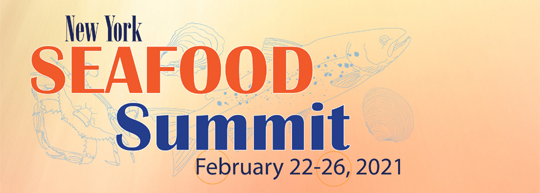
Virtual Event: 2021 New York Seafood Summit
Registration is open for the all-virtual New York Seafood Summit: www.nyseagrant.org/seafoodsummit.
Hour-long sessions will take place Monday - Thursday, February 22nd - 25th, with a two hour session slated for Friday, February 26th.
Each year, NYSG and its partners try to highlight some of the State's bountiful seafood supply and introduce participants to the delicious, diverse, and versatile seafood available locally.
If you have a project, program or resource to share, consider submitting a 2-3 minute pre-recorded lightning talk for the Friday afternoon session.
Questions? Email NYSG's Seafood Specialist Michael Ciaramella, mc2544@cornell.edu.

Webinar Series: Community Science Long Island
Interested in learning more about the volunteer monitoring happening around Long Island Sound?
"Community Science Long Island" is a new educational webinar series for 2021 being hosted by Seatuck Environmental Association, Long Island Sound Study, and New York Sea Grant with support from the New York State Department of State's South Shore Estuary Reserve and Peconic Estuary Partnership.
Once monthly webinars include speakers ranging from researchers, environmental management leaders, and community science project coordinators.
The aim of the series is to raise awareness about community science opportunities (also known as citizen science) in Long Island and the importance of those projects in supporting local environmental management efforts.
Register for webinars via Seatuck's website. And for updates throughout the year, check us out on social media – links for Facebook, Twitter, Instagram and more are available via Long Island Sound Study and New York Sea Grant.
#Research
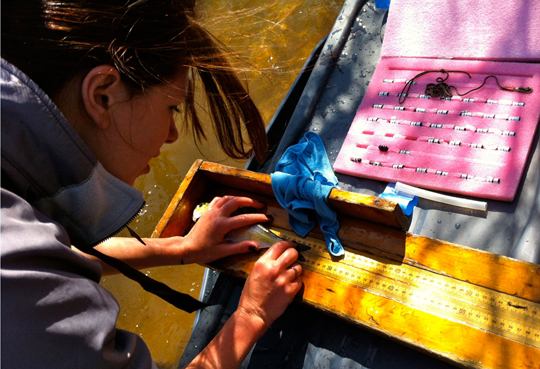
In Photos: New Details About Fish Migration Could Help Their Conservation
Scientists from Stony Brook University and Cornell Cooperative Extension tag alewife to get a more nuanced picture of its spawning migration. Read on >>
Historically, alewife comprise one of the most important fisheries in New York's coastal region. Overfishing, habitat degradation, river dams, and the reduction of access to freshwater habitat have diminished their numbers. Most coastal states restrict anglers' catch of alewife. As recently as 2017 alewife was proposed as a candidate for the endangered species list.
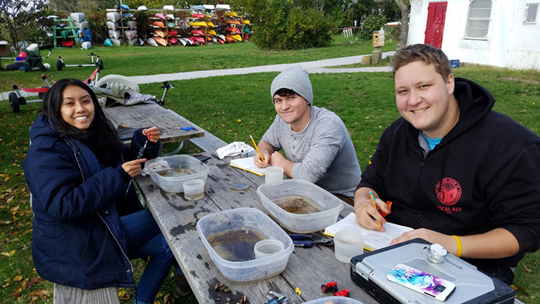
An Urban Estuary Ready for an Oyster Comeback
Cornell University researchers investigated an extensive surviving population of eastern oysters recently found in the Hudson/Raritan Estuary. New York City's coastal waters once were the center of a booming oyster fishery, but now we have almost none. Read on >>
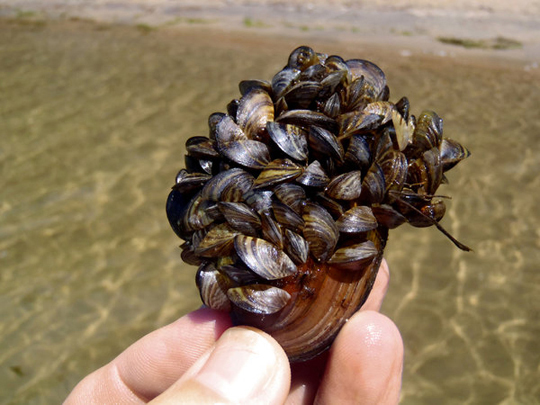
Virtual Seminar Series
This past November, NYSG hosted Stony Brook University's School of Marine and Atmospheric Sciences colloquium speaker Dr. David Lodge from Cornell University. Lodge presented a virtual talk on "Knowledge to Action on Invasive Species."
Also in November 2020, Farmingdale State College's Peter Park led an e-seminar on one of the Marine and Coastal District small grants funded via a partnership effort between NYSG and the New York State Department of Environmental Conservation.
To view these and other seminars in the series, which features NYSG-supported projects, topics and activities of interest to the New York State coastal community and stakeholders that our program serves, visit www.nyseagrant.org/researchseminars.
#Extension
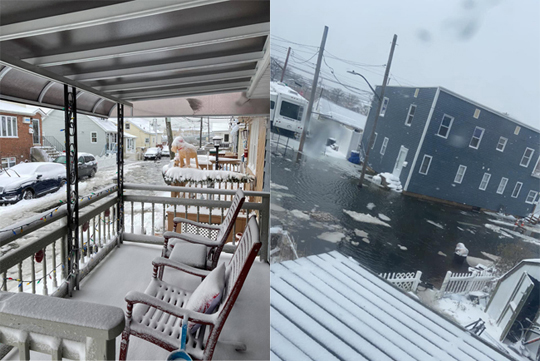
In Photos: Even on Sunny (and Wintery) Days, Floods in NYC Cause Distress
New York City's coastal communities are facing more frequent weather disruptions such as floods, which, according to a new research brief on "Flood Watch Social Impacts," is a hazard that will continue to increase in its severity due to sea level rise. Read on >>
The brief is linked to the Community Flood Watch Project (Flood Watch), coordinated by the Science and Resilience Institute at Jamaica Bay and NYSG in partnership with NYC Emergency Management and the NYC Mayor's Office of Resiliency. Flood Watch uses civic science contributions to collect photographs of tidal flood events, including date, time, depth, duration, and flooding source.
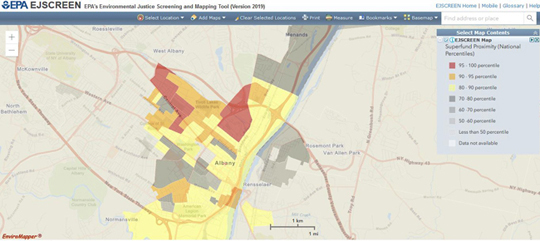
Environmental Justice Mapping Tools Guide for NY Communities
Sea Grant's new Environmental Justice Mapping Tools Guide, which spotlights at-risk neighborhoods in a New York community, includes 22 online mapping tools covering a range of topics that help build context around race, class, and the environment.
During a mid-November 2020 webinar, viewable at www.nyseagrant.org/deiresources, NYSG provided an introduction to environmental justice, how to use the environmental justice mapping tools guide, and demonstrations of select mapping tools. This webinar was open to all, including community members, educators, students, and environmental practitioners so that they could ask their own questions and inform their own analysis.
The document collects information about free, easy-to-use mapping tools that can be used by these target stakeholders to help investigate and define their context and plan projects. As we explored each resource we were guided by environmental justice and how mapping can be a resource for communities to approach environmental issues that matter to them.
#Education
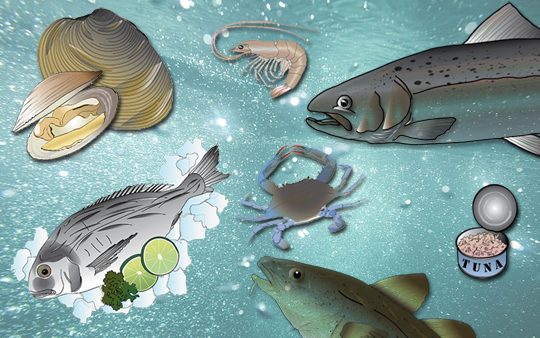
Is Seafood the Way to Thrive Post-COVID-19?
A pair of educators – Michael Ciaramella, NYSG's Seafood Specialist (NYSG), and Linda O'Dierno of the National Aquaculture Association – offer an appealing idea for students who want to thrive post-COVID-19: It's all about sustainable, local seafood. Read on >>
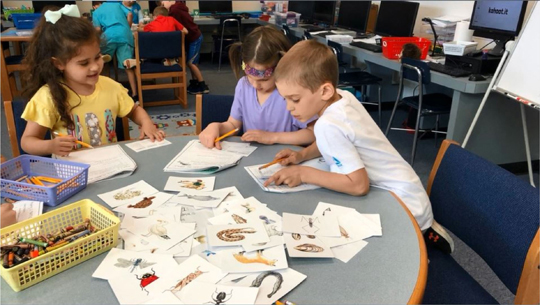
Educational Resources, Funding Opportunities for Teachers
New and revised resources for educators and funding opportunities have been added to the "Great Lakes Ecosystem Education Exchange," www.nyseagrant.org/gleee, a partnerships between NYSG and the New York State Department of Environmental Conservation.
Partner News
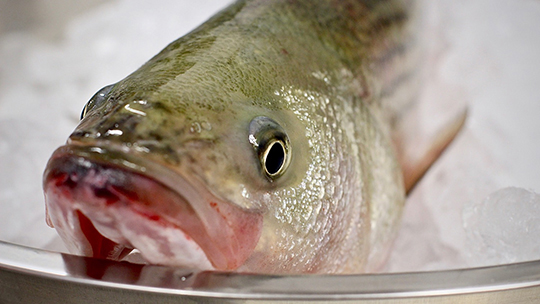
Sea Grant 'StriperHub' to Boost the East Coast Seafood Industry
In an effort to address the need for increased aquaculture production in the U.S., New York Sea Grant is working with investigators led by North Carolina Sea Grant to build a StriperHub across the Atlantic coast. Read on >>
Those involved are working to collect, create and disseminate data and information regarding sustainable and viable striped bass production through various grow-out methods and enhance the consumer market for farmed striped bass.
In addition to the StriperHub, NYSG is leading and/or involved in three additional aquaculture projects from a recent pot of $16 million in federal funds.
National News
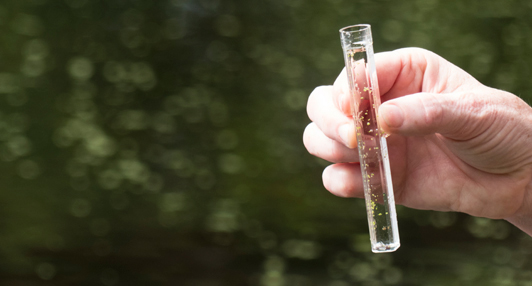
Congress Reauthorizes NOAA Sea Grant through 2025
The National Sea Grant College Act was reauthorized and amended by Congress and signed by President Donald J. Trump on December 18, 2020. The reauthorization, titled the "National Sea Grant College Program (NSGCP) Amendments Act of 2020," includes several updates to Sea Grant's authorizing legislation.
The Act serves as a guiding framework upon which Sea Grant operates and serves America's coastal and Great Lakes communities. Announcements were made via: National Sea Grant | NOAA Research
NOAA: Remain Weather-Ready Beyond Record-Breaking 2020 Atlantic Hurricane Season
An extremely active, record-breaking 2020 Atlantic Hurricane Season drew to a close in late November 2020 after producing 30 named storms, of which 12 made landfall in continental U.S. Climate factors that influenced the record-breaking season include ongoing La Nina + warmer-than-average sea surface temps and weaker wind shear in Atlantic. On the plus side: Improved forecasts, extensive preparedness helped protect lives and property.
And while 2020's hurricane season may have officially ended on November 30th, it is still possible for additional storms to develop. The National Oceanic and Atmospheric Administration (NOAA)'s National Weather Service (NWS) reminds that being "Weather-Ready" is a 365-day/year activity, offering on December 1st (the first day of meteorology winter) some safety tips for seasonal hazards.
You can join NOAA, NWS, the National Sea Grant College Program (NSGCP) and almost 9,000 fellow Weather-Ready Nation Ambassadors this fall by helping communities become ready, responsive, and resilient to extreme weather.
"Be a Force of Nature" and follow the Weather-Ready Nation team on Twitter at @WRNAmbassadors.
NOAA: Marine Economy Report
In late November 2020, NOAA's Office for Coastal Management released its 2020 Report on the U.S. Marine Economy: Regional and State Profiles (pdf). One of the highlights to note from the announcement (and on page 60 of the report): "New York was the largest single contributor to the Mid-Atlantic's marine economy, accounting for almost half the employment (388,000 people) and gross domestic product ($29.2 billion)."
Sea Grant Publishes Research Impacts Paper
This research paper (pdf), released in late November 2020, highlights bibliometric analysis of 6,500+ peer-reviewed publications generated over a 15-year period by the Sea Grant program.
The authors conclude that, with a relatively modest financial investment, Sea Grant-supported research is consistently published in high quality journals; is highly cited in local, regional, and international publications; and reflects a user-driven approach to problem solving. Additionally, they conclude that continued support of programs like Sea Grant will no doubt enhance the quality of life and livelihood in America's coastal communities and Great Lakes region. Read on >>
NYSG's Currents News Archives (Vol. 9, No. 1)

Keep tabs on NYSG's news in between issues of NY Coastlines / Currents via our Web site (www.nyseagrant.org) and blog (www.nyseagrant.org/blog).
Here's a sampling of other stories that have made waves these past few months on our social media platforms (www.facebook.com/nyseagrant, www.twitter.com/nyseagrant, www.instagram.com/newyorkseagrant, www.youtube.com/nyseagrant) and via our site's News (www.nyseagrant.org/currents) and topic-based News Archives (www.nyseagrant.org/currentsarchive) sections ...

NYSG Funded Projects > Research
In Media: Public Reporting Tool Helps Long Island's Suffolk County Track Harmful Algal Blooms (January 2021) Read on >>
In Media: $2.1 Million Awarded for Sea Grant Research on NY's Coastal Environment (October 2020) Read on >>
In Media: Stony Brook Faculty Lead Study on the Performance of Local Oysters (December 2020) Read on >>
NYSG Extension and Education > Rapid Response to COVID-19
On YouTube: Create Your Own Boat Show, Prepare for the Upcoming Season (January 2021) Read on >>
On YouTube: What To Know About Summer Boating (January 2021) Read on >>
On Air: CCE The Coop-Cast Spotlights NYSG's Environmental Justice Mapping Project (November 2020) Read on >>
On Air: Enjoying the Outdoors Safely This Winter (November 2020) Read on >>
On Air: Sea Grant's Tips on COVID-, Family- and Friend-Friendly Winter Activities (November 2020) Read on >>
On YouTube: Remember COVID-19 Precautions When Planning This Winter (November 2020) Read on >>
On YouTube: Winter Safety Reminders From New York Sea Grant (November 2020) Read on >>
NYSG Extension and Education > Great Lakes Waters
In Media: Sea Grant and Buffalo Niagara Waterkeeper Hold an Online Teacher Training (November 2020) Read on >>
NYSG Extension and Education > Marine Waters
On Air: Coastal Resilience in the Hudson Valley (January 2021) Read on >>
In Media: Controlling the Flood Waters (December 2020) Read on >>
On YouTube: Town Looks to Restore Eroded Shoreline in Lindenhurst (November 2020) Read on >>
In Media: The Growing Risk of High Tide Flooding to NYC Communities (November 2020) Read on >>
In Media: Sea Grant's Flood Watch Engages Residents as Citizen Scientists (October 2020) Read on >>
In Media: Green v. Gray - Monitoring Different Shoreline Features Along New York's Coasts (October 2020) Read on >>